
When preparing to graduate college, many people share a common concern: Did their major prepare them for the working world? With tuition costs continuing to rise and an especially tough job market, the choice about whether to go to college is becoming a much more complicated calculation for many. As college formats and options change (particularly due to the COVID-19 pandemic), expectations and hopes for the college experience are likely to change as well.
We recently spoke to nearly 1,000 college graduates and asked them all to think back on their experiences with higher education. Did the experience they had in school adequately prepare them for the world today? What would they change if they could? And how happy or regretful are they for making the decision to go? To find out what they had to say, keep reading.
Getting the Education You Want
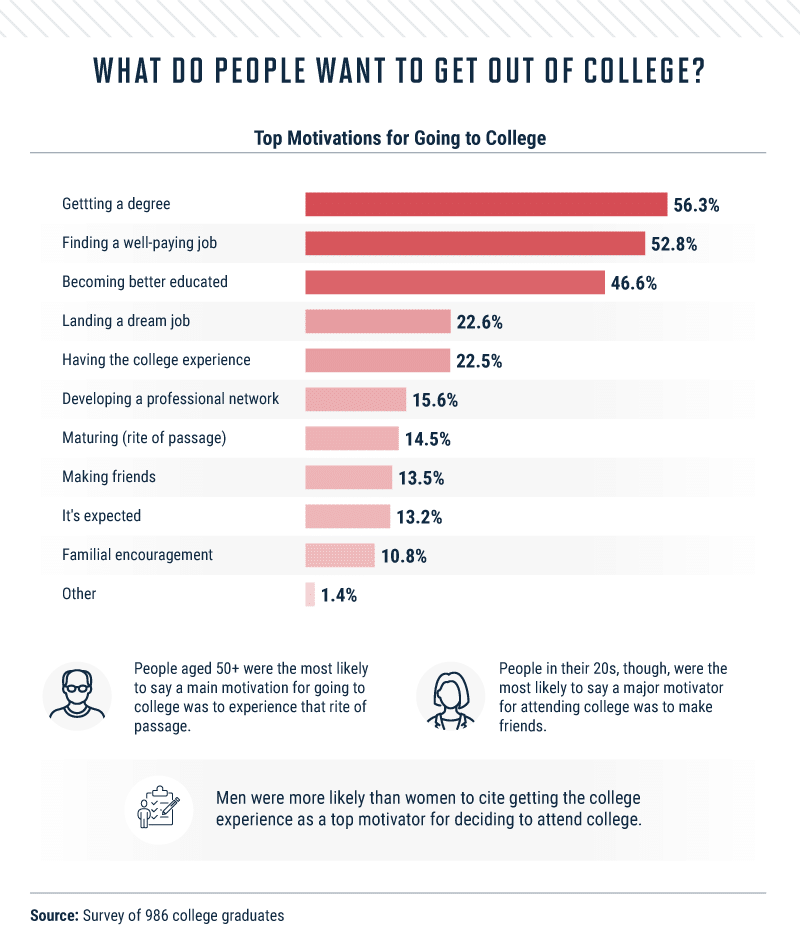
The first part of our study asked respondents what their top motivations were for attending college in the first place. They were allowed to select up to three main reasons for going.
Perhaps unsurprisingly, the most common motivation for going to college was to earn a degree. There is and has been a clear economic and financial edge given to college graduates. Students with a college degree (compared to those without) earn more money and generally fare better in the workplace. It’s no wonder then that the top reason most former students had for going to college was to obtain that degree.
Simply getting the degree was more of a driving force for attending than things like developing a professional network, experiencing the rite of passage, or even becoming better educated. Younger graduates, however, were more likely to say they went to college to try to make new friends. Those 50 and older said it was more about going through that rite of passage for them.
Constructive Criticism for College
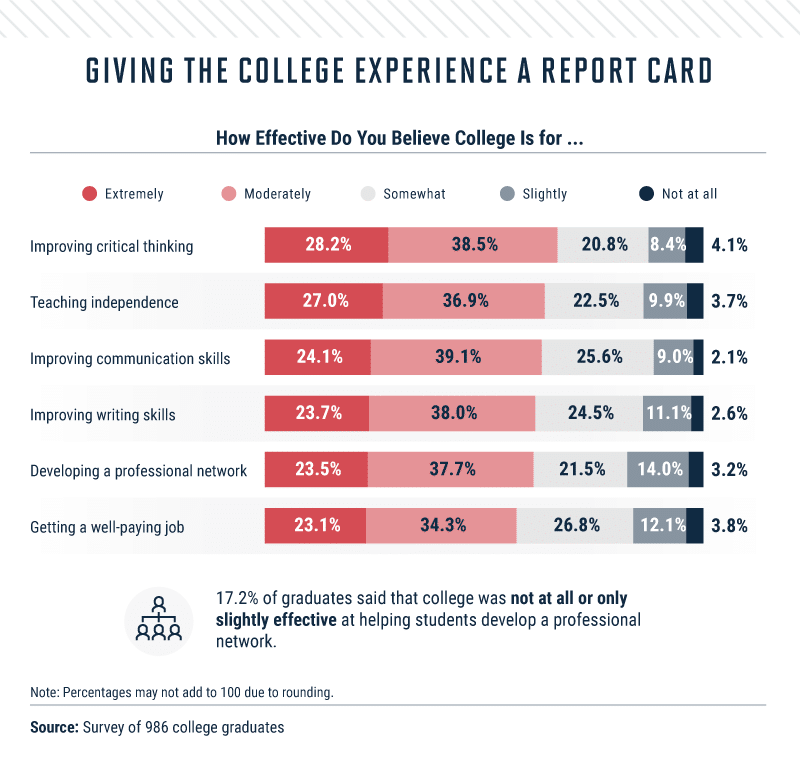
We also wanted to know how effective college graduates felt their education was for developing professional skills, like critical thinking or improved writing skills.
Students did feel a sense of having improved their critical thinking, which refers to the objective analysis and evaluation of an issue in order to form a judgment, in college. Over 90% agreed that the experience helped in developing that skill. Similarly, most agreed that college was an effective place to learn how to be independent. Although many students are now learning remotely from home, independence is certainly fostered as many “leave the nest” for the first time to go to college.
Developing a professional network was more of a weak point, according to graduates. Seventeen percent felt that college was not at all or only slightly effective at helping them develop a professional network. While networking is an incredibly important skill that can certainly occur in college, it doesn’t appear to be explicitly taught or reinforced, which may suggest that it’s better for students to take networking matters into their own hands on campus.
Room for Improvement
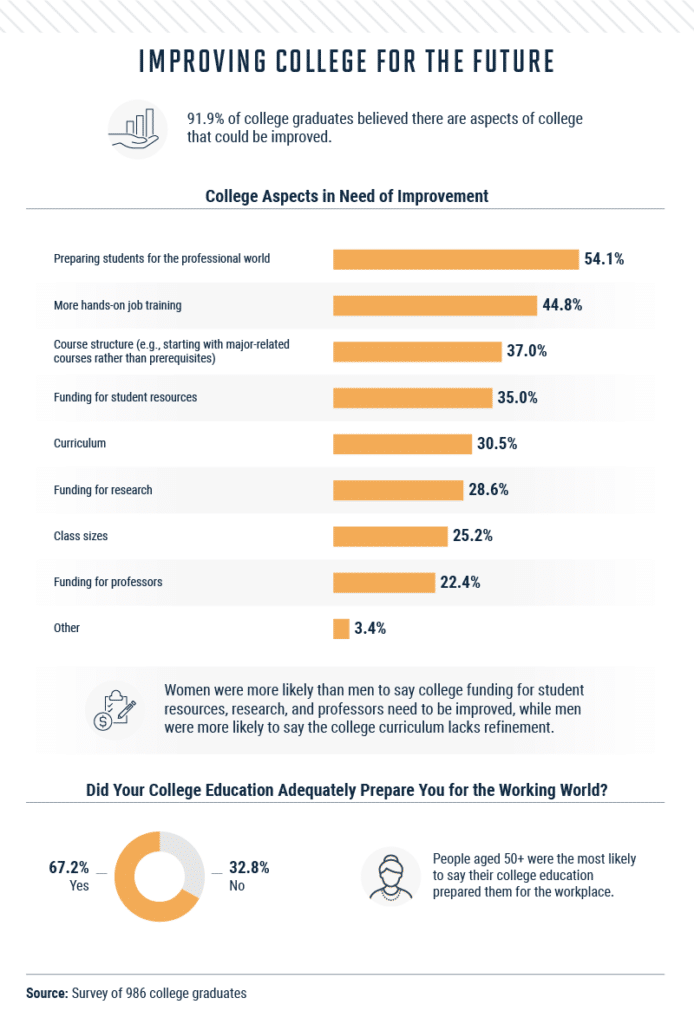
Despite its flaws, the college experience does evolve. Just look how quickly things have changed due to the pandemic. The next piece of our study asked college grads what specifically could be improved on in the current higher education system.
The biggest change students wanted to see was a sense of being better prepared for the professional world. Similarly, 44.8% also wanted more active job training. While these sound like reasonable requests, it’s important to remember just how difficult it is to change the way a school functions.
For instance, Vimal Patel executed exhaustive research on changing the college curriculum for an article in The Chronicle. As he explained it, one of the reasons change is so difficult is that the “curriculum has implications for the very way a university sees itself. So it can change how a university is marketed to prospective students. It can dramatically alter the work schedule of professors and have implications for how many graduate students a department can fund.” Regardless, 30.5% of respondents cited college curriculums as ripe for change.
Even with these areas for improvement identified by respondents, the majority (67.2%) still felt their college education adequately prepared them for the real world. Older respondents – particularly those 50 and older – were even more likely to feel adequately prepared by their college years for their professional life.
Alternative Options
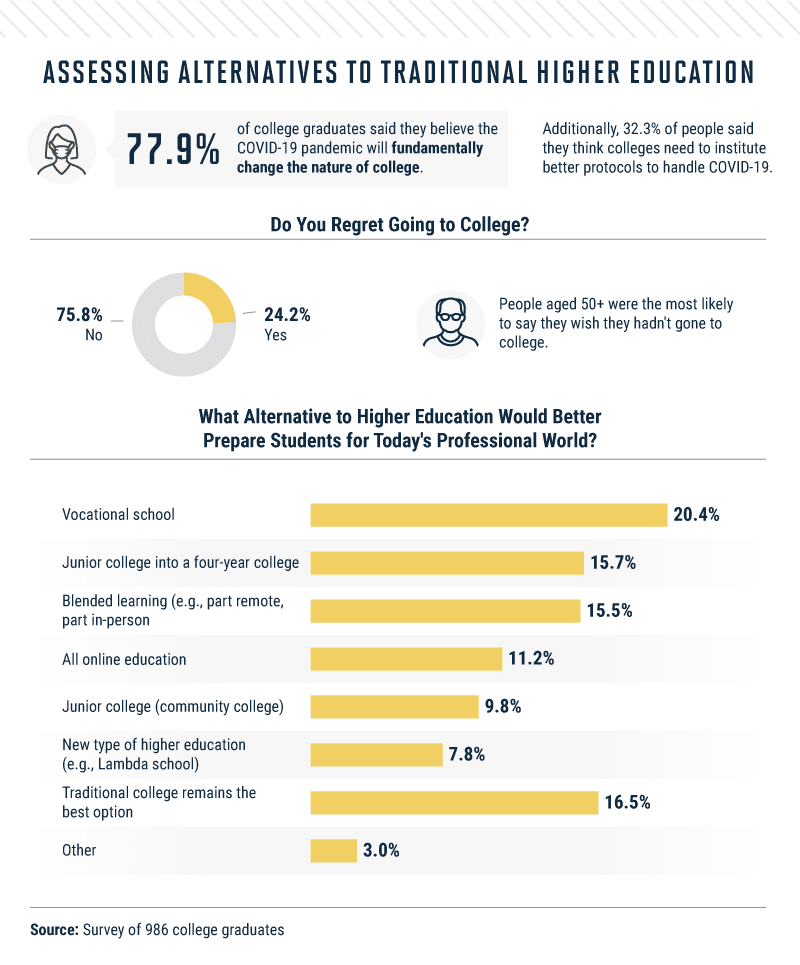
As we sorted through weaknesses of college, we thought it would be best to see how respondents felt about some of the alternatives prospective students have today. Essentially, we wanted to know what alternatives people see as valuable today other than a traditional four-year degree.
Alternatives are a particularly timely discussion with COVID-19: Traditional four-year schools are certainly in a transitive moment. But the change may have been building. Studies show that students have become more discerning about the demonstrated value a college can provide. Their environment is also starting to showcase education-on-demand experiences that they can receive from anywhere. The pandemic actually forced typical learning to adapt to this remote experience, though it’s still not “on demand.” This change was noticed even among graduates: 77.9% believed that the pandemic will fundamentally change the nature of college, and many experts seem to agree.
The most commonly considered alternative was vocational school (20.4%). Vocational schools, which are designed to teach a specific craft, are often considered the choice of “depth over breadth.” Particularly today, many jobs require specialized training in technology that bachelor’s degrees are too broad to adequately address.
More than 10% opted in favor of all online learning. Especially now that so many have been forced to experience online working or learning during quarantine, we may see the percentage who want to learn this way continue to grow. It does offer safety and convenience, in addition to effective education.
An Unconventional Concept for Paying for College
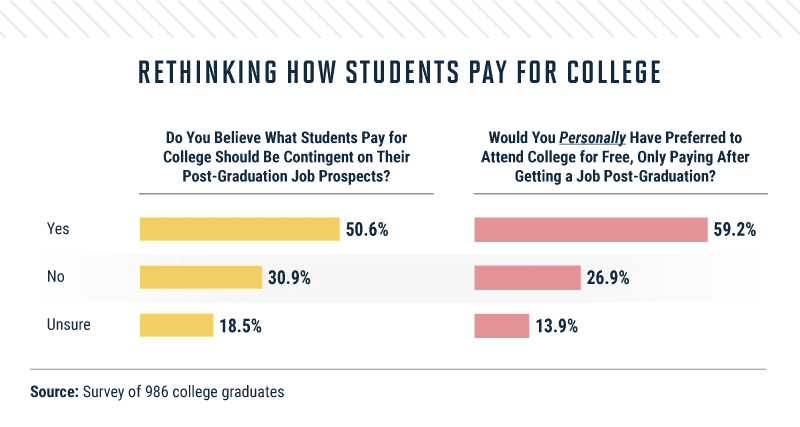
Beyond alternatives to college structure, we also wanted to get a sense for how graduates feel about a potential change to how students pay for college. Online computer science training program Lambda School bases student tuition on a sliding scale that only starts after graduates of the program land a job with a salary of at least $50,000.
It’s an interesting concept – the idea that schools should only make money when students excel. Other coding bootcamps have implemented similar models of not requiring students pay until they find a job.
The college graduates we surveyed seemed to find the idea fairly enticing. Over 50% of respondents said they believe that college tuition should be contingent on students’ job prospects after graduation, much the way Lamda School is. Furthermore, 59.2% of respondents said they personally would’ve preferred to defer their college expenses until they found a paying job post-graduation. Places like Lambda School may be outliers for the moment, but our survey signified that there’s interest in considering that type of model.
Return on Investment
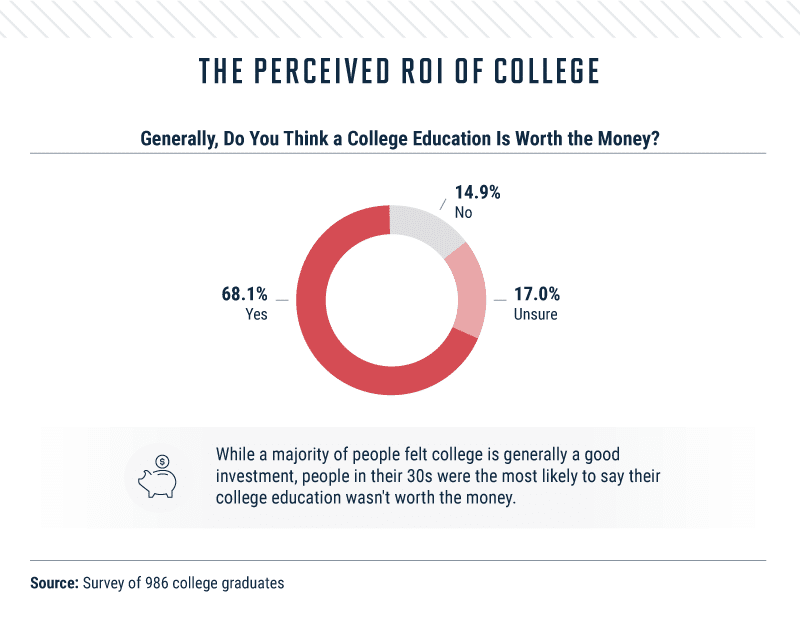
Our study wrapped up with a simple question: Is a college education worth the money?
Most people, regardless of where they went and how much they spent, still believed their college education was worth the cost. Sixty-eight percent of current graduates felt this way. But everybody else didn’t necessarily disagree. There was a substantial 17% who were unsure of whether or not their college experience fit the bill.
Changing College Landscapes
Clearly, people still see value in higher education, but attitudes on what that can and should look like are also evolving. Both student and teacher expectations are rapidly changing, especially with so many having to adapt to remote learning technologies and methodologies. Nevertheless, new options and doors are being opened, despite the trying times.
If you want to make sure you’re choosing higher education that has the best value for you, you’ll want to start with BestValueSchools.org. Your preferences for degree, subject interests, pricing needs, and other priorities can all be accommodated. The technology of BestValueSchools.org will ultimately connect you with the absolute perfect fit for a choice of school today.
Methodology
We surveyed 986 college graduates on their experience in college and how they think higher education will evolve in years to come.
Respondents were 47% women and 52.5% men. Two respondents were agender, one respondent was genderqueer, one respondent was nonbinary, and one respondent chose not to disclose their gender. The average age of respondents was 38.8 with a standard deviation of 11.8.
When reporting their motivations for attending college, respondents were instructed to select up to three options.
The data on aspects of college that need to be improved were collected using a check-all-that-apply question. Therefore, percentages won’t add to 100.
When asked about an alternative to traditional college, respondents were asked to select one from the presented options that they believed would be better than traditional college at preparing students for the working world.
Limitations
The data we are presenting rely on self-report. There are many issues with self-reported data. These issues include, but are not limited to, the following: selective memory, telescoping, attribution, and exaggeration.
Fair Use Statement
College can be a valuable experience, but as with most things, there’s room for improvement and evolution. If someone you know would benefit from the information in this project, you may share for any noncommercial reuse. Please link back here so the entire project and its methodology can be reviewed. This also gives credit to the contributors who make this work possible.


